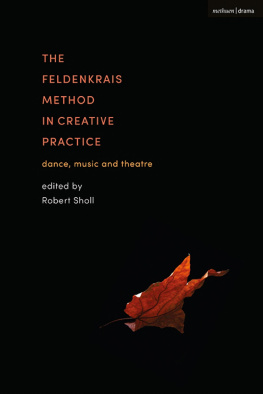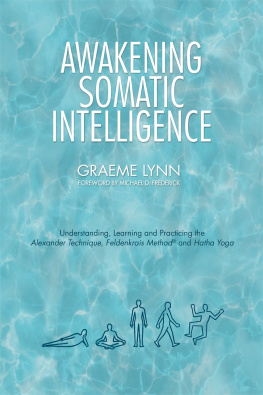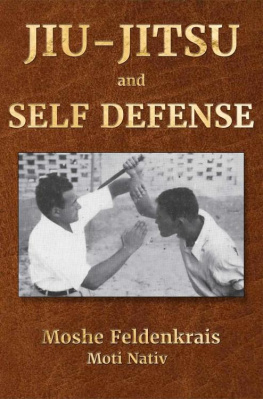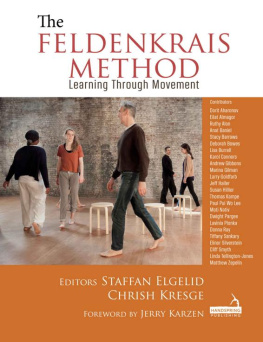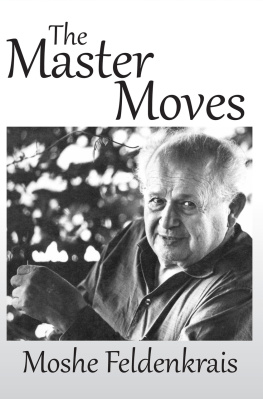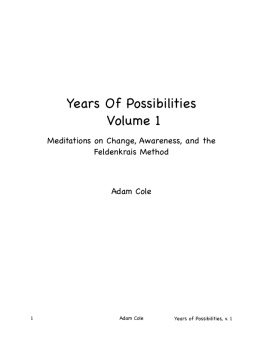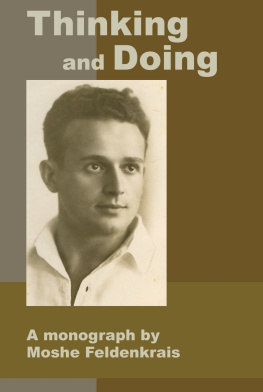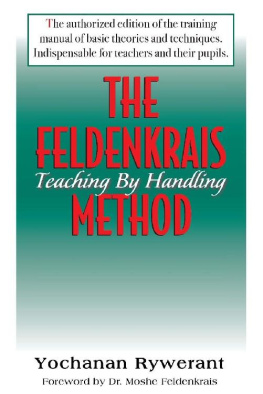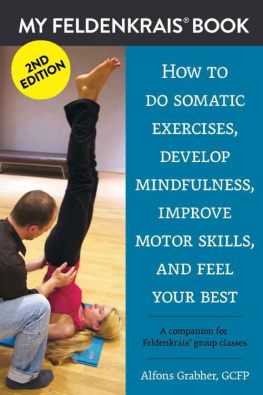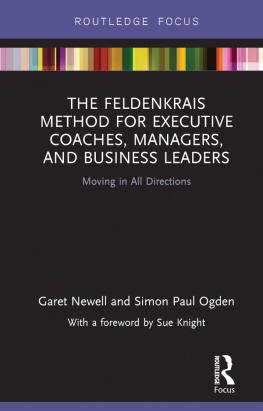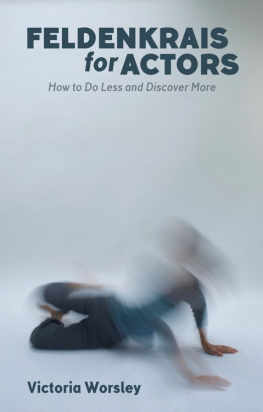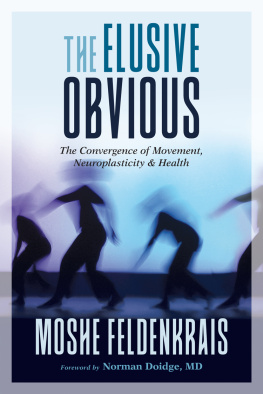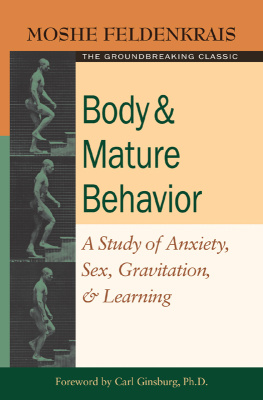THE FELDENKRAIS METHOD IN CREATIVE PRACTICE
THE FELDENKRAIS METHOD IN CREATIVE PRACTICE
DANCE, MUSIC AND THEATRE
Edited by Robert Sholl
CONTENTS
Musical Examples
Jillian Beacon is pianist, researcher and a Guild-Certified Feldenkrais practitioner. She is pursuing a PhD in Human Kinetics at the University of Ottawa as a member of the Piano Pedagogy Research Laboratory. Her research uses motion-tracking technology to study the effects of somatic training on performance attributes and postural coordination patterns of pianists. Jillian holds a Masters degree in piano pedagogy from the University of Ottawa, and a Bachelor of Music in Integrated Studies from the University of Calgary with majors in piano performance and composition. She maintains a teaching studio for piano lessons and Feldenkrais for musicians in Ottawa, Ontario. She is a practitioner, researcher and lecturer at the University of Ottawa Musicians Wellness Centre. She enjoys adapting her knowledge of somatics and motor learning to help students of all ages and abilities more fully engage in the joy of learning music.
Lisa Burrell is on the faculty of Lone Star College and is a violinist, violist, string clinician and a Guild-Certified Feldenkrais practitioner. She is a long-time clinician in Houston public schools, colleges and universities throughout the United States. Her work integrating Feldenkrais into wellness-based curricula in music education has gained global recognition, with recent presentations and workshops in the UK, France, Azerbaijan, Portugal and Finland. For more information about applications of the Feldenkrais Method music pedagogy, visit https://lisaburrellviolin.com/.
Marcia Carr completed her training at Royal Holloway (University of London). She is a Feldenkrais practitioner. Marcia is currently Deputy Chief Examiner for the London Academy of Music and Dramatic Art (LAMDA), an Associate Artist with National Youth Theatre of Great Britain. She was Senior Lecturer at the University of West London and has taught at: East 15; RCSSD; Queens Theatre; Belgrade Theatre; Director of Youth Theatre, Barking; Court Training Theatre; Kingston University; South Bank University; Goldsmiths University; Wolverhampton University; Winchester University and ST&M Theatre School (Amsterdam). Marcia has her own theatre companies, Impetuous Kinship and Creative Blast, working as director, choreographer and physical director.
Gilles Comeau received his PhD in the foundations of music education in 1995 and completed postdoctoral studies in piano pedagogy from 1995 to 1997 with Marc Durand and Gilles Manny. Comeau has been the beneficiary of many research grants, including a large grant from the Canadian Foundation for Innovation to set up a $1.2 million research laboratory in piano pedagogy. As head of this infrastructure, he has established partnership with many other research laboratories and research institutes and set up different multidisciplinary research groups that study various aspects of piano learning and piano teaching: music reading, motivation, physiological aspect of piano performance, piano-playing health injuries, video-mediated learning. He has written various scholarly research papers and his research findings have received coverage in popular media outlets (television, radio and newspapers). He has authored many books, including Piano Pedagogy: A Research and Information Guide ; Comparing Dalcroze, Orff and Kodly ; the five-volume series Histoire illustre de la musique pour les jeunes musiciens ; and over twenty education kits used by music and arts teachers.
Sylvie Fortin is full professor in the Dance Department at the University of Qubec in Montreal, where she developed a graduate programme in somatic education in 2000. She is a Feldenkrais practitioner since 1994. Throughout her career, she has received funding from Canadian and Qubec Research Councils for a series of interdisciplinary research projects involving dancers and non-dancers with varying bodily issues. Using both dance and the Feldenkrais Method, she has worked consistently with professional dancers, children and adults with diverse issues such as fibromyalgia, depression, eating disorders, neuromuscular and degenerative diseases, as well as stroke patients and people with addiction problems. In Montreal, she has a private practice in an interdisciplinary health clinic, where she offers Feldenkrais group classes for adults and individual Feldenkrais sessions for children with motor development challenges. She is a well-known prolific author with over 100 articles or book chapters in numerous scientific and professional journals. Sylvies international recognition as a researcher and practitioner has led her to conduct workshops in Africa, the Americas, Asia, Australasia and Europe.
Born in Montreal in 1955, Canadian pianist Alan Fraser sang in le Studio de Musique Ancienne de Montreal for its first ten years, studied Tai Chi with Sam Slutsky and piano with Phil Cohen. He moved to Yugoslavia in 1990 to study with Kemal Geki and completed a Feldenkrais professional training programme in 1992, the same year he became Gekis assistant at the Art Academy of Novi Sad, Serbia. In 1999 he spent a year teaching at the Wuhan Conservatory in mainland China, where much of the material was transcribed for his first book, The Craft of Piano Playing (Scarecrow Press, 2003). Back in Serbia he continued to apply the principles of Cohen, Geki and Feldenkrais to piano technique, producing Honing the Pianistic Self Image in 2010 and All Thumbs: Well-Coordinated Piano Technique in 2012. He has several more books nearing completion: Play the Piano with Your Whole Self, Transforming the Pianistic Self-Image and Pianimals: Developing the Young Pianists Hand . As a concert pianist he has performed in Canada, the United States, Great Britain, France, Germany, Italy, Hungary and Yugoslavia/Serbia. He directs the Alan Fraser Institute of Piano Somatics held in various European and North American cities, enriching piano artistry by linking the physical dimension of piano playing to the musical.
Thomas Kampe has worked as a performing artist, researcher and somatic educator across the globe. He is Professor of Somatic performance and Education at Bath Spa University, where he co-directs the Creative Corporealities Research Group. Artistic collaborations include work with Julia Pascal, with Liz Aggiss, Hilde Holger, Tanzinitiative Hamburg, Somatische Akademie Berlin, and with Carol Brown on re-embodying the diasporic practices of Modernist choreographer Gertrud Bodenwieser. Thomass research and writing has focused on articulating critical somatic legacies. He has collaborated with scholar Glenna Batson on writings on somatic-informed dance education, and recently edited JDSP Vol. 9. (2017): Bodily Undoing: Somatics as Practices of Critique with Kirsty Alexander. He is a practitioner of The Feldenkrais Method and guest editor of the IFF Research Journal Vol. 6 (2019): Practices of Freedom: The Feldenkrais Method and Creativity .
Mark Lacey is an actor, director, educator and choreographer who specializes in the research and development of effective performance methods through the reinstatement of autonomy in individuals and industries. He studied physical theatre with Desmond Jones and Antonio Fava and became International Street Entertainer of the Year 1993 before going on to study acting at Central School of Speech and Drama. He qualified as a Feldenkrais teacher under Garet Newell in 2007. During his final year he became the first teacher in the UK to develop a full Feldenkrais module for a professional acting course in an accredited drama school. He went on to introduce the Method to many major acting schools, nationally and internationally. He is company director of The House of Glass Angels which supplies personal and project development for performing arts professionals who have become alienated from the industry for social-economic or health reasons. Marks company aims to develop new models of corporate structures that reinstate trust and autonomy in the work place that maximizes productivity and quality without sacrificing employee health and wellbeing.

